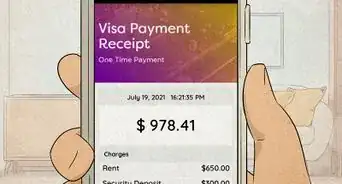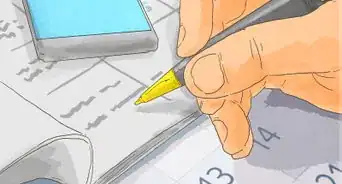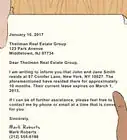This article was co-authored by Nathan Miller. Nathan Miller is an entrepreneur, landlord, and real estate investor. In 2009, he founded Rentec Direct, a cloud-based property management company. Today, Rentec Direct works with over 16,000 landlords and property managers across the United States, helping them manage their rentals efficiently.
There are 7 references cited in this article, which can be found at the bottom of the page.
This article has been viewed 18,501 times.
Whether you’re having difficulty buying a home right now, don’t want to commit to living somewhere long-term, or just need a temporary place to stay, you may be looking to find a rental home to move into. Although you may be a little intimidated about the prospect of finding a rental property you can call your home, it’s actually a pretty easy process. Determine the parameters of your search, figure out what type of home is best for you, then use the Internet, print ads, and word of mouth to find homes in your budget.[1] Happy hunting!
Steps
Locating Available Rentals
-
1Search trusted online rental sites to get a sense of local prices. There are a lot of different rental search engines online that allow you to narrow your search based on price, size, location, and other factors. Use these websites to look at properties in the area you want to rent in and to see what the typical price range is.[2]
- Some of the most popular sites used to search for rental properties include Abodo, Apartments.com, Craigslist, Hotpads, Realtor.com, Trulia, and Zillow.
- Don’t rely solely on the Internet to find your rental property. While it’s a helpful way of getting general information about available homes in the area, using these search engines won’t tell you everything you may want to know about a particular neighborhood, such as the look and feel of it.
-
2Draw up a budget and calculate how much you can pay in rent.[3] According to the U.S. Census Bureau, your monthly rent should never be more than 20%-30% of your monthly income. Thus, before you can find the property that’s right for you, you need to calculate what price range you can actually afford in rent.[4]
- For example, if your income is $2,000 a month, you shouldn’t pay more than $400-$600 in rent.
- The amount you can afford to pay for rent may vary based on your personal financial situation. For instance, if you earn $2,000 a month but never spend more than $1,000 on bills and living expenses, then you can theoretically afford up to $1,000 in monthly rent.
Advertisement -
3Work with a real estate broker or realtor to use their expertise. After you’ve gotten a sense of what the available properties in an area are like, enlist a real estate broker or realtor to help you locate the best properties for you. Many realtors will perform this service free of charge and will also be better equipped for finding a property that meets your specific criteria.[5]
- Make sure you work with a realtor who specializes in rental properties, rather than home sales, to get the best assistance for your situation.
- Unless you're uncomfortable about finding properties yourself, don’t pay a realtor to help you find a rental home. There are several free methods to do this, including working with other realtors who won’t charge you.
-
4Look in print media if you’re mainly interested in local rental properties. Newspapers, for example, often have listings that include both “for rent by owner” properties and properties that realtors are advertising. Local newsletters and marketing publications also often have properties listed in them, although your selection will probably be pretty small.[6]
- You can also look on a newspaper’s website for property listings, if you don’t have access to the physical paper.
-
5Contact the neighborhood association for assistance. If you’ve narrowed your search down to a particular neighborhood, the neighborhood association may know of some houses that are either available for rent or will be available soon. Even if they can’t necessarily find you a rental home in their neighborhood, they’ll probably know the area well enough to be able to give you some pointers for finding a property nearby.[7]
- If you don’t know where the association’s office is located, search the name of the neighborhood online with the words “neighborhood association” or “homeowners’ association” to find their contact information.
-
6Avoid scams that ask you to pay a fee up front. You should never have to make any sort of down payment or pay a fee in advance for finding or looking at rental properties. Refrain from giving anybody your credit card information before you’ve actually decided on a rental property, as well.[8]
Determining What Type of Rental is Right for You
-
1Opt for renting an apartment if you want a centrally located home. If you’re moving to an urban area and want to live downtown, most of the available rental properties will probably be apartments. While these locations will provide you with the most convenient location, they will probably also be the most expensive rental properties.[9]
- If you’re looking at rental properties in a major city with a competitive real estate market, like New York, you’ll probably need to hire a real estate broker just to get you an appointment to see any available locations.
-
2Go with a townhouse or single-family home if you want lots of space. These types of rental properties tend to be much cheaper than centrally located apartments and are more spacious, both in terms of square footage and sometimes in terms of yard space. However, these properties are often harder to find listings for, so consider hiring a real estate broker to help you locate them and secure you an appointment.[10]
- If you’re subletting a townhouse or home directly from the owner, you may also find maintenance to be unpredictable or that the owner is slow to respond to maintenance issues.
-
3Decide what features you need to have in your rental. These should be features of your rental that are absolutely necessary for your standard of living. For example, you may require that your rental home have a certain number of bedrooms or bathrooms, that it be within walking distance of your job, or that it be in a low-crime area. Whatever parameters you set, just make sure these are requirements for your rental home and not just features that you’d like to have.[11]
- For example, while it may be nice to have a front yard of a certain size, it probably shouldn’t be something your next rental home absolutely has to have.
Going Through the Renting Process
-
1Save up enough money for the first month’s rent and security deposit. A lot of landlords will require you to make a down payment before you can actually rent from them. This payment usually takes the form of the first month’s rent and a security deposit, which you will typically receive back at the end of your lease.[12]
- The amount of the security deposit varies from landlord to landlord, although it is often also equal to the first month’s rent.
- You won’t have to actually pay this money to the landlord until you’ve signed the lease, but you should definitely make sure you have the money before you sign anything.
-
2Make sure your credit is good before submitting your application. Most landlords require their applicants to have a relatively good credit score, since they’re more likely to be able to pay their rent in the long run. You can check your credit score for free using certain free websites or pay to see your FICO score.[13]
- The best free website to use is annualcreditreport.com, which allows you to see your credit score for free once a year.
-
3Bring identification and financial documents when you go to apply. You should bring a letter of employment that shows you’re gainfully employed, your most recent pay stubs indicating your monthly income, and your driver’s license. If you have reference letters from previous landlords, bring these as well.[14]
- If you don’t have these reference letters, ask your current or former landlords for them! They can really strengthen your rental application with future landlords, especially if you have bad credit.
-
4Walk through the rental and inspect it before you sign the lease.[15] You’ll want to make sure that all the lights, faucets, and other fixtures are in good working order and that there’s no obvious sign of damage. This not only ensures you’re moving into a good home, but also keeps you from potentially losing your security deposit when you go to move out, since management might blame you if these fixtures still don’t work by then.[16]
- Do not sign a lease for an apartment without being able to walk through it first.
- Bring a cell phone charger and use it to make sure all of the outlets work. If the rental comes with any appliances, turn all of these on to make sure they work as well.
Expert Q&A
-
QuestionWhat should I avoid doing when looking for a rental home?
 Nathan MillerNathan Miller is an entrepreneur, landlord, and real estate investor. In 2009, he founded Rentec Direct, a cloud-based property management company. Today, Rentec Direct works with over 16,000 landlords and property managers across the United States, helping them manage their rentals efficiently.
Nathan MillerNathan Miller is an entrepreneur, landlord, and real estate investor. In 2009, he founded Rentec Direct, a cloud-based property management company. Today, Rentec Direct works with over 16,000 landlords and property managers across the United States, helping them manage their rentals efficiently.
Property Management Specialist When you are looking to rent a house, make sure the house fits in accordance with your future plans. If the house you are interested in is not going to support or achieve all your goals, it’s better to continue looking and find something better. It’s also important to look beyond the house and see if you like the neighborhood and city you are planning on renting in.
When you are looking to rent a house, make sure the house fits in accordance with your future plans. If the house you are interested in is not going to support or achieve all your goals, it’s better to continue looking and find something better. It’s also important to look beyond the house and see if you like the neighborhood and city you are planning on renting in.
References
- ↑ Nathan Miller. Property Management Specialist. Expert Interview. 15 October 2018.
- ↑ https://www.curbed.com/2017/6/22/15854516/best-rental-apps-sites-services
- ↑ Nathan Miller. Property Management Specialist. Expert Interview. 15 October 2018.
- ↑ https://www.moneycrashers.com/how-to-find-cheap-apartments-for-rent-guide/
- ↑ https://realestate.usnews.com/real-estate/articles/should-you-use-a-real-estate-agent-to-find-your-next-rental
- ↑ http://www.frugal-mama.com/2010/04/how-to-find-a-quality-house-to-rent/
- ↑ http://www.frugal-mama.com/2010/04/how-to-find-a-quality-house-to-rent/
- ↑ https://www.zumper.com/blog/2018/04/most-common-rental-scams-and-how-to-avoid-them/
- ↑ https://www.moneycrashers.com/how-to-find-cheap-apartments-for-rent-guide/
- ↑ https://realestate.usnews.com/real-estate/articles/should-you-use-a-real-estate-agent-to-find-your-next-rental
- ↑ https://www.forbes.com/sites/forbesrealestatecouncil/2017/06/22/how-to-select-your-first-rental-property/#68c9810566f8
- ↑ https://www.moneycrashers.com/how-to-find-cheap-apartments-for-rent-guide/
- ↑ https://www.moneycrashers.com/how-to-find-cheap-apartments-for-rent-guide/
- ↑ https://www.moneycrashers.com/how-to-find-cheap-apartments-for-rent-guide/
- ↑ Nathan Miller. Property Management Specialist. Expert Interview. 15 October 2018.
- ↑ https://www.moneycrashers.com/how-to-find-cheap-apartments-for-rent-guide/
About This Article
To find a rental home, perform a search using an online rental service, such as Abodo or apartments.com, to get an idea of what’s available. If you know you want to rent in a specific area, check local newspapers or marketing newsletters, which often list rental properties. You can get help with your search by hiring a realtor, since they are experts in finding properties based on specific needs. Once you find a place you like, arrange to meet with the landlord to view it. Bring along some form of identification, a letter confirming your employment status, and letters of recommendation from your previous landlords, which will strengthen your application. For tips on how to avoid rental scams, keep reading!

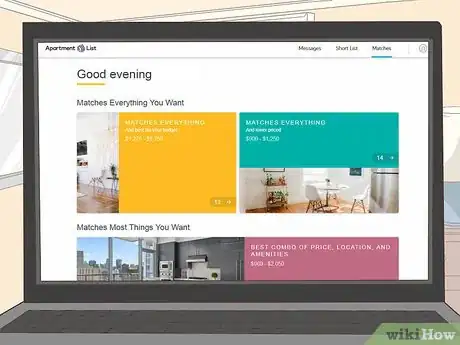
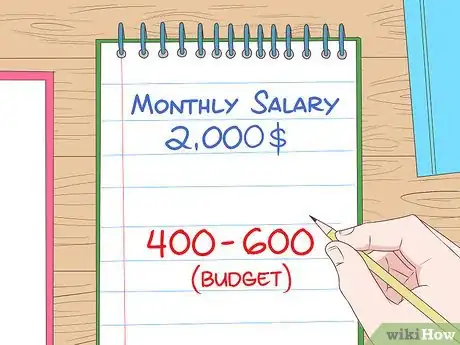

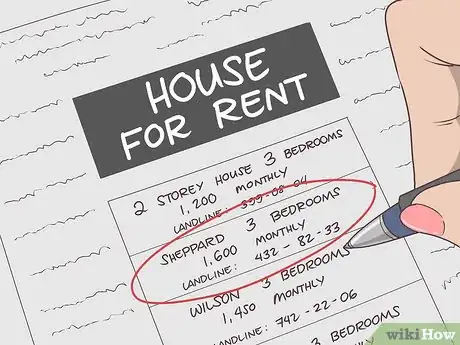
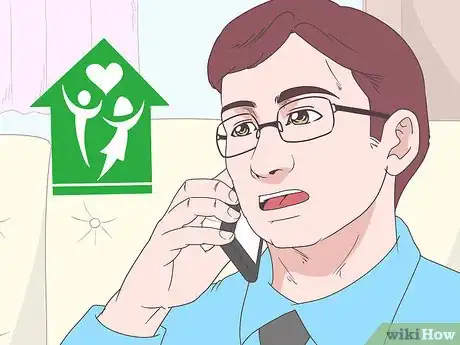

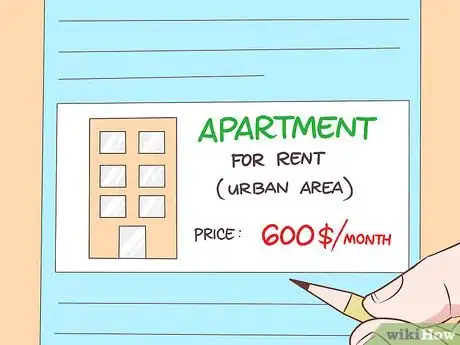
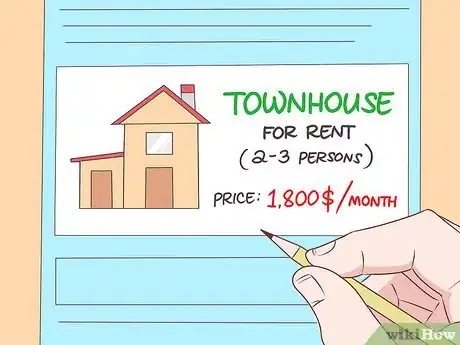
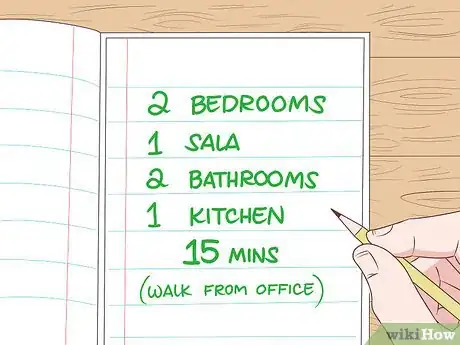
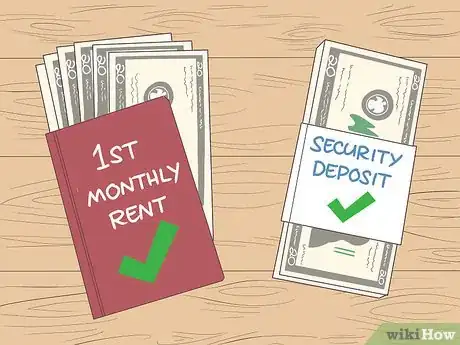

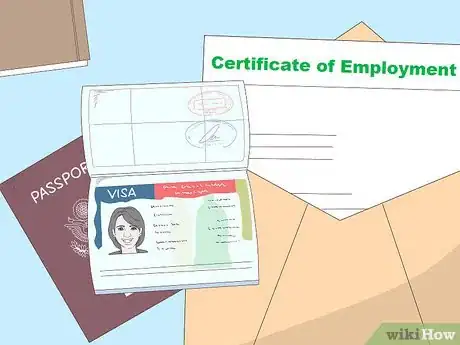
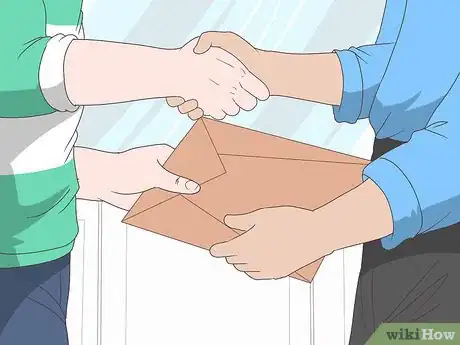
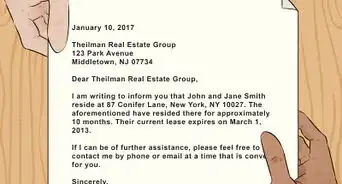
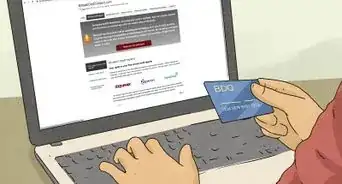


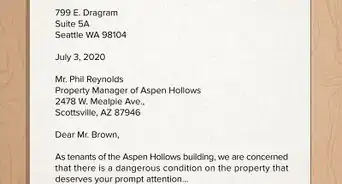

-Step-10.webp)


